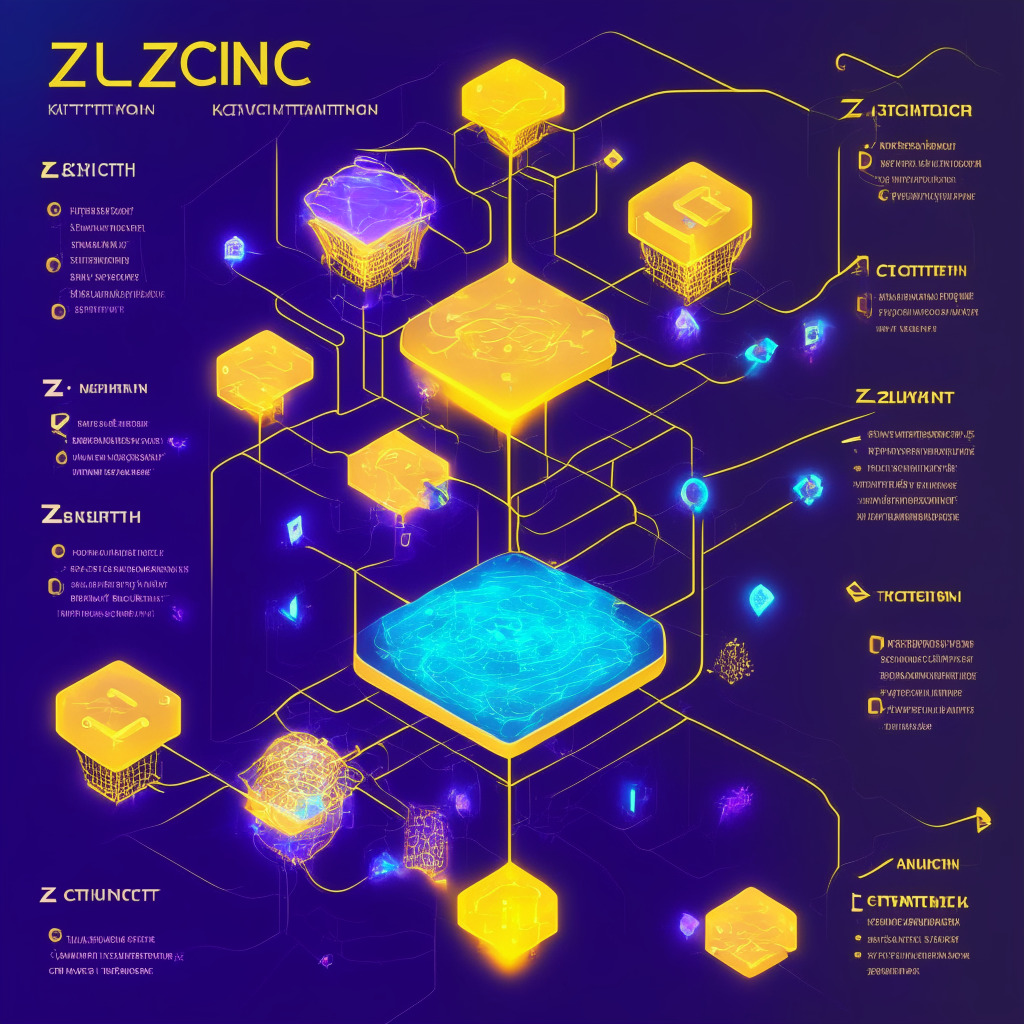LINK, Chainlink’s crypto, is witnessing a 65% rally from June lows, spurred by increased risk appetite for altcoins. The recent launch of Cross-Chain Interoperability Protocol (CCIP) contributes to LINK’s upward trend, inviting “smart money” to bet on it. This could potentially anticipate 2x gains, yet, diversification and cautious investment strategies are advised.
Search Results for: Oracle
Rapid Scaling of Ethereum: Harnessing the Power of ZK-Proofs and the Challenge of Off-chain Computations
“The Ethereum ecosystem is encouraging competition, with many firms developing Zero-Knowledge Scaling solutions. This technology enables secure off-chain computations and only light, non-data-revealing proofs on the Ethereum mainnet. Despite its efficiency, questions arise about the sustainability and security of off-chain transaction computations.”
Crypto Heist Chronicles: The $888,000 Rodeo Finance Exploit – Unraveling the Clever Labyrinth
“Rodeo Finance on the Arbitrum network lost 472 ether ($888,000) in a crypto exploit. The hacker utilized Oracle manipulation techniques to adjust price feeds and exchange stolen tokens into diverse assets, before converting them back into ether. Such incidents highlight the increasing risk and vulnerability in the DeFi domain.”
The Two Faces of DeFi: Unraveling the Recent Rodeo Finance Exploit and Security Concerns
“The recent exploit of the Arbitrum-based Rodeo Finance, causing a loss of $1.53 million, underscores blockchain’s vulnerability. The incident questions protocol safety, emphasizes need for robust security, smart contract auditing, and user responsibility. The exploitation also raises skepticism towards the shift to Decentralized Finance.”
Chainlink’s Proof-of-Reserves: True Transparency or Illusion of Accountability?
Chainlink’s proof-of-reserves service promises to allow crypto custodians to directly monitor real-world assets on blockchains, increasing safety and transparency for DeFi users. However, the durability of this solution is questioned as the credibility of data depends on the source, possibly masking inadequate accounting practices and reinforcing trust issues in centralized entities.
Teleporting Assets: Storage Proofs Revolutionize Cross-Chain Transfers and Security
Storage proofs, a cryptographic method aiming to revolutionize cross-chain asset transfers, may provide a more secure alternative to vulnerable bridges in the growing blockchain ecosystem. Starknet plans to be the first network to natively integrate storage proofs, potentially eliminating intermediary third-party “oracles,” offering enhanced security and user experience for asset transfers.
AI & Blockchain Revolutionize Parametric Insurance: The dRe Lifecycle Dashboard Debuts
Arbol and The Institutes RiskStream Collaborative have introduced the dRe Lifecycle Dashboard, an AI and blockchain-driven parametric insurance platform. The smart contract-based system automates claims, enhances transparency, and utilizes data from dClimate and Chainlink’s oracle network for parametric loss calculations in severe storm catastrophe transactions. The platform’s adaptability positions it as a game-changer in the insurtech landscape.
Revolutionizing Parametric Insurance with AI and Blockchain: The dRe Platform Debate
Arbol’s dRe platform offers AI and blockchain-driven parametric insurance for reinsurance, targeting severe storm catastrophes. Leveraging dClimate’s weather data and Chainlink’s oracle network, the platform automates claim initiation, notifications, and loss calculations for faster payouts and improved transparency, aiming to revolutionize the reinsurance market.
DeFi Bounties: Encouraging Hackers or Protecting Funds? The Sturdy Finance Dilemma
Sturdy Finance reopens stablecoin market after an $800,000 exploit, offering a $100,000 bounty for the attacker’s assistance in recovering funds. The incident sparks debate on whether bounties deter malicious actors or attract potential attackers, while hackers develop tactics to hide stolen funds.
Ethereum’s EigenLayer Launch: Restaking Revolution and Its Impact on Security & Flexibility
Ethereum mainnet recently deployed EigenLayer, a restaking protocol supporting tokens like stETH, rETH, and cbETH, aimed at extending Ethereum’s security to bridges, oracle networks, and consensus mechanisms. With EigenLayer, stakers grant permission to smart contracts while earning rewards and delegating validation, enhancing security and offering flexibility for stakers, operators, and actively validated services.
Banks and Chainlink Team Up for Blockchain Interoperability: Possibilities and Security Risks
World’s largest banks, including Citi and BNP Paribas, are testing permissioned bank-owned blockchains under SWIFT’s guidance to enable communication with public blockchains like Ethereum. Chainlink’s technology will serve as the bridge, overcoming network fragmentation and ensuring secure information sharing across public and private chains.
Unveiling Uniswap v4: Customizability, Hooks, and 99% Lower Gas Costs
Uniswap v4, the latest update to the top-performing decentralized exchange, introduces customizable features and draft core code for community-driven development. The release includes innovative smart contract “hooks,” enabling extended liquidity pools, time-weighted average market makers, dynamic fees, and more, while slashing pool creation gas costs by 99%.
DeFi Platforms Offer Bounties to Hackers: Recovering Funds or Encouraging Exploits?
Sturdy Finance has offered a $100,000 bounty to the hacker responsible for an exploit resulting in a loss of nearly $800,000 in digital assets. Although this controversial approach has potential to recover lost funds, it may also encourage malicious activities and set a dangerous precedent for future DeFi incidents.
DeFi Exploit Costs Sturdy Finance 442 ETH: Analyzing Security and Future Safeguards
Sturdy Finance, a DeFi lending protocol, recently suffered an exploit resulting in a loss of 442 ETH (around $768,800). The platform has paused activity for investigation. The attacker allegedly manipulated the price oracle of a collateral pool, draining funds from Sturdy using a re-entrancy attack.
DeFi Protocol Exploits: Balancing Innovation with Robust Security Measures
Sturdy Finance, a decentralized finance (DeFi) protocol, recently suffered a security exploit with a loss of 442 Ether ($800,000). The vulnerability was linked to a faulty price oracle, emphasizing the need for vigilance, strengthened security measures, and continuous monitoring in the crypto space.
SWIFT and Chainlink Collaboration: Tokenizing Assets for a Unified Blockchain Future
SWIFT collaborates with major banks and Chainlink to trial connecting private and public permissionless blockchains using Chainlink’s Cross-Chain Interoperability Protocol (CCIP). This aims to enable tokenized asset transfers across public and private networks, potentially increasing the blockchain industry size significantly.
Integrating Liquid Staking into zkSync Era: Exploring Advantages and Overcoming Challenges
Era’s integration with Rocket Pool allows users to stake ether (ETH) while holding rETH and receiving rewards automatically. Though facing challenges, Rocket Pool’s research team explores zk proof technology for potential advantages like lower costs, increased efficiency, and a streamlined system.
Revolutionizing Sports: Red Bull Racing’s Blockchain Partnerships & What It Means for the Industry
Red Bull Formula One Racing and Mysten Labs-backed Sui network announce a multiyear partnership, aiming to offer globally available digital experiences through blockchain technology. The collaboration follows Red Bull Racing’s $150 million sponsorship agreement with crypto exchange Bybit, highlighting blockchain’s potential to revolutionize traditional industry practices in sports.
Crypto Meets Formula 1: Mysten Labs’ Impact on Racing and Fan Engagement
Web3 infrastructure firm Mysten Labs partners with Red Bull Racing, introducing blockchain technology into Formula 1. This collaboration enables fan engagement through staked tokens and showcases the growing influence of crypto and Web3 in the sports industry.
Sui and Formula One’s Red Bull Racing: Revolutionizing Fan Experience or Risky Venture?
Sui, a blockchain platform, partners with Formula One’s Oracle Red Bull Racing team to create innovative digital experiences for racing enthusiasts. The collaboration highlights the growing trend of sports teams teaming up with crypto and blockchain companies, revealing potential for increased fan engagement, despite possible volatility and regulatory challenges.
Cryptocurrency Market Tug of War: Regulatory Uncertainty vs Increasing Adoption
The cryptocurrency market faces a tug of war between regulatory uncertainty and increasing adoption, with mixed results for key cryptocurrencies like Bitcoin and Ethereum. As enthusiasts, it’s crucial to monitor price fluctuations and consider factors such as potential regulatory crackdowns and industry adoption of blockchain technology.
Regulating DeFi Applications: ConsenSys Proposal for UK Authorities and Its Challenges
ConsenSys, an Ethereum development studio, suggests that the UK government should focus on regulating crypto applications rather than blockchain protocols. This targeted approach aligns with Web2 internet regulation, addressing potential risks and specific activities without imposing limitations on blockchain infrastructure. The UK Treasury will review received feedback to shape its regulatory response, balancing safety and innovation in the DeFi and cryptocurrency industry.
Curve Considers Reducing Chainlink Reliance: Pros, Cons, and Implications for DeFi Future
Curve is considering reducing reliance on third-party protocols like Chainlink by implementing solid price oracles in select pools with deep liquidity. Ensuring proper liquidity management and assessing risks and benefits will be key to maintaining pool stability and safety in decentralized finance.
Binance NFT Loans: Unlocking Potential or Opening Pandora’s Box for Crypto Borrowers?
Binance introduces a non-fungible token (NFT) loan feature allowing borrowers to use NFTs as collateral to borrow cryptocurrency without selling assets. This service initially supports profile NFT collections like BAYC, Azuki, MAYC, and Doodles, and utilizes a Peer-to-Pool approach for a secure experience.
EU Watchdog Eyes DeFi Regulations: Balancing Innovation and Financial Stability
The European Systemic Risk Board (ESRB) expresses concerns over the digital asset and decentralized finance (DeFi) sector, suggesting new regulations for crypto conglomerates and smart contracts. The ESRB warns about risks in crypto lending, staking, and high-leverage digital asset markets, potentially requiring DeFi developers to follow specific smart contract regulations.
Bridging TradFi & DeFi: Interest-Rate Swaps Enter Blockchain with Voltz and Avalanche
Voltz Protocol introduces interest-rate swaps on Avalanche’s layer-1 blockchain, bridging the gap between traditional finance (TradFi) and decentralized finance (DeFi). The integration of SOFR hedging aims to make financial markets more accessible to a wider audience.
Ethereum Consensus: Balancing Validator Roles and Security Risks Beyond the Merge
Ethereum co-founder Vitalik Buterin cautioned against extending Ethereum’s consensus beyond essential functions like validating blocks and securing the network. He highlighted that expanding consensus “duties” increases costs, complexities, and risks, potentially exposing the ecosystem to security vulnerabilities or 51% attacks. Buterin advocated for a minimalistic approach and assisting developers in finding alternative security methods.
Chainlink VRF and Arbitrum One Unite: Unlocking New Smart Contracts and DApps
Chainlink and Ethereum Layer 2 scaling solution Arbitrum have launched Chainlink Verifiable Random Function (VRF) on Arbitrum One, uniting both platforms for new smart contracts and decentralized application (DApp) development, featuring secure, scalable, and fair applications such as NFTs and gaming.
DeFi Turbulence: DOJ Pursues Hackers, Lawsuits, and Ethereum Un-Staking
The DOJ’s crypto czar, Eun Young Choi, highlights the prominence of chain bridges thefts and hacks involving DeFi, emphasizing North Korean state-sponsored hackers’ significant role in exploits. Meanwhile, Ethereum un-staking commenced on the Beacon Chain and Coinbase Cloud joined forces with Chainlink Oracle network to improve smart contract reliability.
Chainlink and Coinbase Cloud: Strengthening Network or Compromising Decentralization?
Chainlink announces partnership with Coinbase Cloud to strengthen its oracle network’s capacity and security as a node operator. While this collaboration may raise centralization concerns, it also offers the benefits of experienced companies with robust infrastructure, ensuring network reliability and high security standards.
Coinbase Cloud Joins Chainlink as Node Operator: Boosting Decentralization and Smart Contract Security
Coinbase Cloud announces a partnership with blockchain oracle network Chainlink, operating as a node operator to improve decentralization and smart contract reliability. By leveraging its global infrastructure and blockchain data expertise, Coinbase Cloud aims to enhance Chainlink network’s security and reliability, connecting smart contracts to data and systems.
Blockchain’s Industry Revolution: Achievements, Challenges, and the Road Ahead
The recent Cointelegraph article explores blockchain’s potential to revolutionize various industries and discusses concerns regarding scalability, energy consumption, cybersecurity risks, and regulatory challenges. This insightful piece maintains a balanced viewpoint, encouraging informed decisions about blockchain’s rapidly evolving market.































